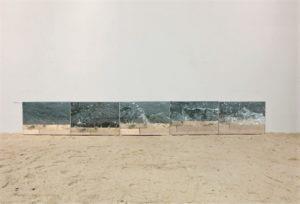https://www.juliet-artmagazine.com/en/serbian-art-scene/


Serbian Art Scene

https://www.juliet-artmagazine.com/en/serbian-art-scene/


Serbian Art Scene
• 22 JULY 2019
• FOCUS
Attheendofthe1980s,intheworld,therewasagrowingrealizationoftheideaofglobalizationwhich beginningwassymbolicallymarkedbythefalloftheBerlinWallin1989.However,inSerbianregion,the situationwasquitetheopposite:whilefactualandimaginarywallsweretumblingdowninEurope,inour formerYugoslavstatetheywereabouttoberaisedrapidly,soinsteadofglobalization,wefacedasudden localization. The ranges of movement, both physical and mental, constrain almost to the complete isolationofsociety,theghettoizationofcultureandthemarginalizationofart.
Inresponsetothewarandthecrisisofallprevious(moral,cultural,human)values,somepostmodern artists begin actions based on the idea of protest and critique of reality while others “distance themselves”, i.e.continuewiththeirwork,sotheirartworksfromthisperioddonotreflecttheobvious justificationinthecontextoftheunfortunatetimesandtherestrictedspaceinwhichtheyemerged.Inmy
https://www.juliet-artmagazine.com/en/serbian-art-scene/
opinion,suchactions,asaformofdeflectionfromreality,werepartoftherevolt,butnotthroughclearly definedactivitiesthatreflectedtheattitudeofbeing“against”,butthroughpassivecreationofpersonal microcosm in an attempt to preserve the integrity and autonomy of art for some better times. It is significanttonotethatbothformsofprotestretainthetendencytowardhighartcriteriaasitsdominant characteristic.
Thechangeofpoliticalpowerin2000broughtanewuplifttotheartscenebutitalsointroducedneoliberal capitalism that treats art as an industry and artwork primarily as a commodity which value is exclusivelydeterminedbythemarket;therefore,artisalsoexpectedtofinditsnewplacewithinthesocalled“creativeindustries”.
Today,inSerbianwell-knownpolarizedsociety,therearestilltwocourses:onederivedfromthe1980s heritage(openness,Europeanandworldorientation),andthesecondbasedontheheritageofthe1990s (traditionalism,nationalism,kitschasamainstream).Tooestablishedtobeanalternative,toonumerous to be a subculture, the postmodern artists in today’s simulacrum of normality remain faithful to themselvesandpositionthemselvesinrelationtothenew,engagedart.
Now,someexamplesfromtheexhibition“80s&90sToday–TheRhythmDivine”,GalerijaSLU,Niš.
Perica Donkov’s Deaf Room ofmonumentalformatisanextremelyemotional,statementartwork.Inthe deafroomtherearenosounds:thepersonandtheprocessofsustaininghis/herlifearetheonlysounds
heartbeats,breathing,“sound”ofthoughtsabsorbedbythewallsoftheroom.Thedeafroomrepresents theareaofabsoluteisolationofanindividual.Thevisualrhythmdepictsslowness,immutability,andthe conceptual rhythm depicts reflections, contemplations and, most of all, emotions. The work is characterized by a minimalist, conceptual approach to art and complete abstraction – a reduced, pessimisticcolouring(grey,black),horizontallinesandsurfaces–suggestafenceoraborder. Dark, almost monochrome photos with rare light and colour accents make Nina Todorović’s installation Defensive Structures Underground. While retaining their documentary character, the photographs foremost expresses the emotional aspect of intimate confrontation with the fear of “the others”.Thedarkatmosphereofalienationispresentinundergroundspacesarticulatedbyarchitectural elements(supportingconcrete pillarsandwirefenceslikecages)thattheartistaccurately,analytically frames.Thewiredfencemotifispresentinalmosteveryphotograph:evenwhenthereisanemptyspace inthecentreofthecomposition,theyaresomewherearound,loomfromthesides,orwefeelthatthey
https://www.juliet-artmagazine.com/en/serbian-art-scene/
arehiddeninthedark.Thesearenotjust“our”cages,butalsothecagesof“others”,placednexttoeach other.Theworkradiatesthesilence–thereisnocommunication,everymanisanislandhere.
Marija Dragojlović’sfrieze Water presentsfiveauthorialphotosonwhichtheartistintervenedincolour, imprintingapersonalnote,apartofhermemoriesandemotionsintoherphotowork.Therepresentation oftheseawhichrippleshittingthewhitestonesoftheVenetiancanalawakensinusthesenseofintimacy, the atmosphere of memory, the evocation of the personal experiences of the sea, the rhythm of overwhelmingthoughtsandemotions.
Srđan Apostolović’swork Dual Activ,createdbycombiningandcollatingtwoprayerkilims,represents acombinationofready-madeandconceptuallogic.Therhythmofkilims’designpatterns,therhythmof theartisticinterventionoffragmentation,uncoveringandcoverage,therhythmofcolourscreateaplayful, elegantconceptualpuzzleofanunexpectedcustomisation.
Vladimir and Milica Perić’s installation titled Salt of the Earth is a conceptual upgrade of their work Kleine Garten (Small Garden). Havingcollagedthesamedetail,oneforeveryofthirty-sevendifferent author photographs showing fences of an Austrian village and the vegetation behind and in front of them, 37kaleidoscopicpatterns–“smallgardens”ofanhexagonalformarecreatedtobegivenanewlife byPerićartistictandem.Thevisualrhythmdefinestheradialexpansionofthepatternswithfencesand greeneryinthehexagoncentres,andtheconceptualcontinuationofgrowthandnewlifeoccurringinthe jarswiththeearthbeneaththem.Artificialsmallgardenscreateanallusionof“plastic”lifeintheposthumanisticera,whilethenaturalprocessesoftheformationofmouldsandbacteriainandonearthinthe jarsbringusbacktotheverybeginningsoflifeonearth.Mini-installations(smallgardensonajarfilled with soil) behave as separate units – each for themselves but together they make a unique body of differentplants.
https://www.juliet-artmagazine.com/en/serbian-art-scene/
 Marija
Dragojlović, Water 1-5, 2015,photosdigitallyprintedonaquarellepaper,drypastel,colourpencils,(5x) 79×120,5cm,courtesyoftheauthorandART-ZOOM
Marija
Dragojlović, Water 1-5, 2015,photosdigitallyprintedonaquarellepaper,drypastel,colourpencils,(5x) 79×120,5cm,courtesyoftheauthorandART-ZOOM
https://www.juliet-artmagazine.com/en/serbian-art-scene/
Todorović, Defensive Structures Underground (001,004,009,011,012,014,015,023i024,)2009-13, Lambdaprint,(9x)100×56cm,courtesyoftheauthorandART-ZOOM
 Nina
Nina
https://www.juliet-artmagazine.com/en/serbian-art-scene/

 Perica
Donkov, Deaf Room – pressure, 2019,acrylonsackcloth,350x320cm,courtesyoftheauthorandARTZOOM
Srđan
Apostolović, Dual Activ,2016,wood,textile,(2x)67x124x75cm,courtesyoftheauthorandART-ZOOM
Perica
Donkov, Deaf Room – pressure, 2019,acrylonsackcloth,350x320cm,courtesyoftheauthorandARTZOOM
Srđan
Apostolović, Dual Activ,2016,wood,textile,(2x)67x124x75cm,courtesyoftheauthorandART-ZOOM
https://www.juliet-artmagazine.com/en/serbian-art-scene/

GraduatedArthistoryattheUniversityofBelgrade,FacultyofPhilosophy.Formercuratoranda memberofinLucidaGalleryartcouncil.Oneofthefoundersanddirectoroftheassociationforthe developmentandpromotionofcontemporaryvisualartsART-ZOOM.LivesinBelgrade,Serbia.
 VladimiriMilicaPerić, Salt of the Earth,2017,installation,digitalprintonplastic,37jarscontainingsoil; intotal37elements(singleelementdimension:25×29cm),variabledimension.Courtesyoftheauthors andART-ZOOM
Ivona Fregl
VladimiriMilicaPerić, Salt of the Earth,2017,installation,digitalprintonplastic,37jarscontainingsoil; intotal37elements(singleelementdimension:25×29cm),variabledimension.Courtesyoftheauthors andART-ZOOM
Ivona Fregl